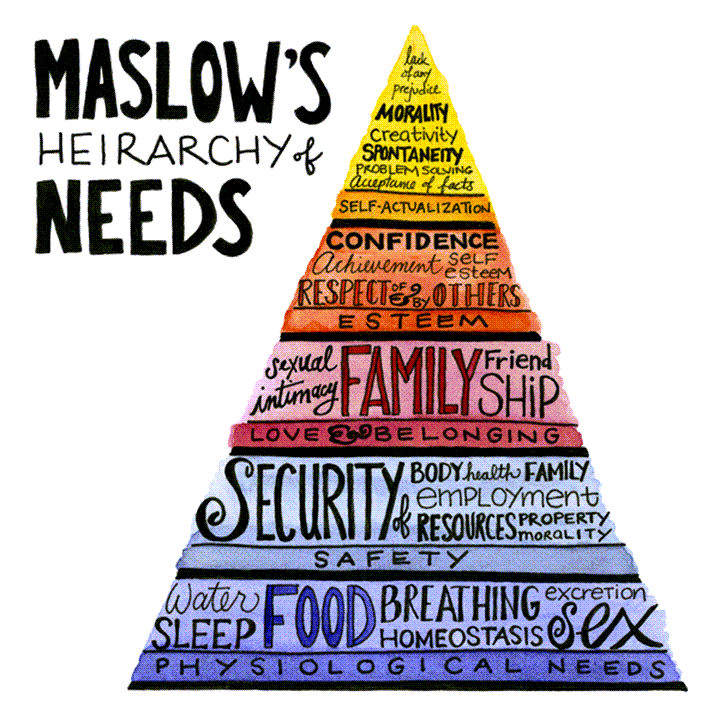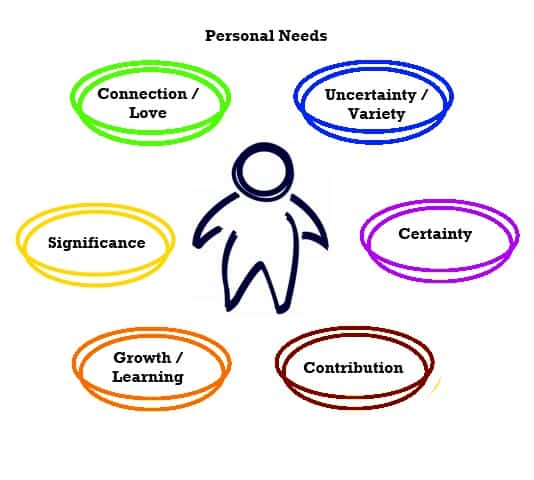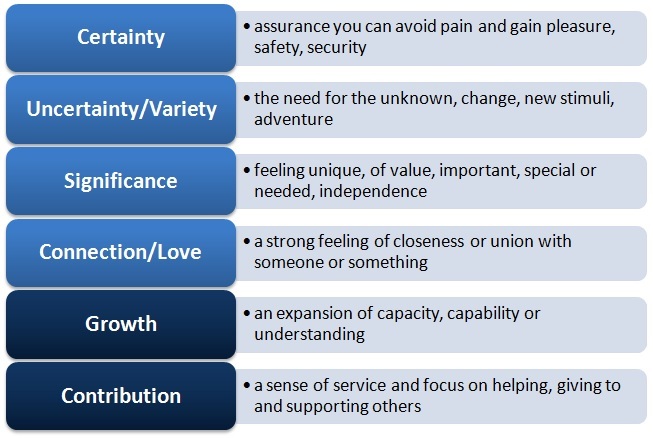What are the Six Human Needs?

Let’s first review Abraham Maslow’s theory of human needs. In 1943, Abraham Maslow proposed the hierarchy of psychological needs, illustrating an order of human motivation.
Often depicted as a pyramid because Maslow initially suggested that we must satisfy our Physiological Needs first, followed by our need for Safety, then the need for Love and a Sense of Belonging, then the need for Self-esteem, and finally, the need for Self-actualization in that order.
Self-actualization occurs when the more basic needs are met or in the process of being completed.
Then, it becomes possible for personal and social fulfillment to exist—through creativity, intellectual Growth, and social progress.
Maslow later clarified that the order in the hierarchy “is not nearly as rigid” as he originally implied.
For example, for some, the need for Self-esteem could be more important than the need for Love. And for others, the need for creative fulfillment may supersede even the most Basic Needs.
So other words, we all have needs in common, but the order and importance are uniquely yours!

For these reasons, Cloé Madanes, a world-renowned innovator and teacher of family and strategic therapy, separated the Emotional areas from the Physical and reworked the needs into “The Six Human Needs.”
Cloé explains that the Six Human Needs are not “Desires”; these are actual “Psychological Needs” that we continually try to satisfy consciously and subconsciously.
Your needs influence your deepest motivations and determine how you prioritize your decisions and actions throughout your life.
If you try to meet those needs that are not in line with your values, you will experience conflict and discontent.
On the other hand, when you can align your needs with your highest values, you will feel more fulfilled and complete.

The Six Human Needs work in pairs – Certainty with Variety, Significance with Love & Connection, and Growth with Contribution.
The first two pairs are in constant search of balance.
When you feel that you don’t have enough of one of the needs when you have too much of the other.
On the other hand, the bottom two needs, Growth, and Contribution, can grow separately or with each other.
When the Need for Certainty / Comfort is Important to You

- You want to feel secure, safe, and comfortable at all times, now and in the future.
- Avoiding pain is very important to you.
- You can’t be happy when you’re uncertain about things.
A high need for Certainty/Comfort means striving to feel safe and secure. You want predictability and a sense of Comfort, which gives you peace of mind and helps ward off stress, anxiety, and worry.
The need for Certainty is often characterized by the need to acquire short-term pleasure, irrelevant of whether it will lead to long-term pain.
When you strive to satisfy the need for Certainty, you might eat or drink alcohol excessively, smoke, or use recreational drugs.
Additionally, you might procrastinate or attempt to control other people.
These behaviors provide you with a sense of Comfort in the present moment, but they could also potentially lead to pain in the long run.
The need for Certainty, of course, doesn’t have to end with negative consequences. On the contrary, Certainty is sometimes necessary because it provides emotional stability and financial security.
Learn more about when the need for Certainty / Comfort is important to you.
When the Need for Uncertainty / Variety is Important to You

- You believe happiness comes from many experiences and challenges that exercise your emotional, intellectual, or physical range.
- Your emotional well-being requires Uncertainty, suspense, and surprise.
- It would be best if you had the excitement that comes from variety.
The need for Uncertainty / Variety means that you are constantly striving for variety and change. The combination makes life much more interesting, unpredictable, challenging, and fun.
In your search for Uncertainty, you might decide to take risks or confront your fears to deal with conflict.
If you’re currently experiencing conflict, it could be due to your need for Uncertainty.
Your need for Uncertainty could be so strong that you’re purposefully looking for high-stress crises that create discomfort.
This might seem silly on the surface; however, the alternative is predictable, safe, secure, and dreary.
As with anything good, an oversupply of a good thing is always riddled with consequences.
And an excess of Uncertainty can often lead to higher levels of stress, worry, overwhelm, frustration, and fear.
This can very quickly get out of control. And as a result, you immediately turn to Certainty for Comfort, predictability, and security.
And so, the cycle goes on as you jump from one need to the next in succession. How quickly or far you jump will depend on how you prioritize your needs.
Learn more about when the need for Uncertainty / Variety is important to you.
When the Need for Significance is Important to You

- You believe that happiness comes from feeling respected and essential.
- It would be best if you were considered unique and special.
- You need people to look up to you and even fear you to a certain extent.
The need for Significance means continually striving to feel important, memorable, unique, and worthy.
You have all these goals you would like to achieve, so many incredible skills you would like to develop, and a respected status you would like to pursue.
All this provides you with Significance and a sense of accomplishment.
When you gain Significance compared to others, you reach a stage where you feel more important and worthy.
You feel more significant when achieving something, building something, and learning something, or sometimes by tearing other people down.
The need for Significance can help you achieve more, do more, and become the person you desire to be.
All professional athletes would probably admit that the need for Significance is a big part of their careers.
It’s perhaps one of the most important influential factors in every decision they make.
On the other hand, the need for Significance can be used for evil purposes. For instance, it can hurt people or gain an unfair advantage.
Take, for example, a bully. A bully bullies other people to feel important, significant, and worthy.
We must accept that we live alongside others when everything is said and done. Society is built upon relationships, connection, mutual respect, and Love.
This is important because too much Significance can lead to separation anxiety and loneliness.
Learn more about when the need for Significance is important to you.
When the Need for Love / Connection is Important to You

- To feel worthy, you need to love and be loved.
- It would be best if you had meaningful connections with people.
- You’re worthless if you’re unloved and can’t give your Love.
The need for Love / Connection means that you are continually striving to connect and build strong social bonds and relationships with other people.
This is the main reason why we get married, why we attend church gatherings, why we spend time in nature, why we gather at clubs, and why some people choose to join gangs.
It’s all because of a need to feel connected to other people.
No longer do we want to feel significant. Instead, connections with other people help us avoid bouts of depression and loneliness.
However, ironically, the deeper we connect with others, the more susceptible we fall prey to criticism and rejection.
And when you put Love / Connection above all other human needs, you might often do it at the expense of adventure and variety.
Say, for instance, you find your soul mate, you get married, and because you value connection above all else, you no longer take risks, play sports, and pursue adventure.
Suddenly, your priority levels have shifted, and you no longer seek Uncertainty. Instead, you might now value connection and even Certainty above all else.
Now, consider how an oversupply of the need for Love / Connection can lead to a loss of identity.
With this loss comes the need to feel important, unique, and worthy. And as such, your relationships with other people start to break apart.
Learn more about when the need for Love /Connection is important to you.
When the Need for Growth is Important to You

- You need to constantly develop new skills, learn new things and improve what you already know.
- You must develop yourself physically, emotionally, intellectually, and spiritually.
- You need to be constantly growing.
The need for Growth means that you continually strive to learn new skills, gather knowledge, and grow as a person. So you have this picture of yourself in the future — of how you desire to be.
And your need for Growth pushes you to reach for that ideal self.
So when the need for Growth is at its highest, you continuously strive to grow emotionally, spiritually, physically, financially, and intellectually.
Growth is a crucial aspect of life. If you’re not growing, you’re making no real progress.
However, Growth isn’t necessarily about learning a new skill or reading a good book.
It’s more about the time you put into self-reflection.
Moreover, it’s about your mindful approach to understanding the consequences of your daily decisions, choices, and actions.
The need for Growth isn’t a primary need. This means it’s not a need everyone from all walks of life strives to fulfill.
However, it’s an essential need because, without Growth, there is a lack — of dissatisfaction.
Without Growth, your life may even feel as though it’s stagnating.
On the surface, you may be fulfilling the four primary needs:
- You’re comfortable
- You experience some uncertainty
- You feel significant
- You also satisfy your need for connection
However, if you’re not growing and evolving psychologically, you feel dissatisfied and unfulfilled, and you don’t know why.
Learn more about when the need for Growth is important to you.
When the Need for Contribution is Important to You

- Life is incomplete without the sense that one contributes to others or a cause.
- You have to go beyond your own needs and give to others.
- You want to give back and leave a mark on the world.
The need for Contribution means living out your life’s purpose and providing value to others that go well beyond your needs, desires, and wants.
You are primarily living for a higher purpose — for something greater than yourself that can potentially last a lifetime and beyond.
The need for Contribution stems from our need to share ourselves, help others, and add value to their lives.
It’s about making a difference to individuals, the community, society, and the world.
This, of course, doesn’t mean that all of us will significantly change the world. Instead, it means we work on something that gives life more significant meaning and purpose.
So, whether your acts of kindness help change one life or many lives makes no difference.
Instead, it’s all about the intention behind the work that matters.
To satisfy the need for Contribution, you might volunteer your time to a cause, a charity, or a community project.
Alternatively, you might fulfill this need by helping someone solve a problem or, maybe, by teaching a class at a local community center.
It doesn’t matter what you do as long as what you do provides you with a sense of fulfillment that you are doing something greater than yourself.
Learn more about when the need for Contribution is important to you.
Four Classes of Behavior
Your habits, actions, and emotions can all be classified into four distinct classes or kinds of behavior.
Understanding these four behavior classes is essential as they will help you gather valuable insights into your motivations and psychological tendencies.
The right thing to do is always make decisions leading to Class 1 and Class 2 behaviors.
These behaviors will typically lead to long-term pleasure. But, on the other hand, it’s essential to avoid the traps of Class 3 behaviors.
This kind of behavior feels good on the surface (short-term pleasure). However, the long-term consequences are rarely, if ever, pleasurable (long-term pain).
Likewise, being aware of the consequences of Class 4 behaviors is essential. This is often characterized by unconscious emotional responses, habits, and behaviors that catch us off guard.
You will recognize these experiences because they don’t feel good and lead to painful consequences.
The Six Human Needs are built upon your motivations. These motivations influence your decisions and lead to certain behaviors you indulge in.
Some behaviors will be categorized as Classes 1 and 2, while others will be characterized as Classes 3 and 4.
Therefore, some will be good for you, while others will only tend to cause you pain.
Class 1 Behavior
Class 1 behavior is typically characterized by actions that concurrently lead to short- and long-term pleasure.
These behaviors:
- Feel good at the time
- Are good for you
- Are good for others
- And serve the greater good
Self-sacrifice and giving Love to another person fall into a class 1 behavior type.
Class 2 Behavior
Class 2 behavior is typically characterized by short-term pain leading to long-term pleasure.
These behaviors:
- Don’t feel good at the time
- Are good for you
- Are good for others
- And Serve the greater good
Working hard on a project to gain long-term rewards is an example of a class 2 behavior.
Also, exercise is another example of a class 2 behavior.
When you exercise, you experience short-term pain. However, the exercise seems worthwhile because you will inevitably encounter long-term pleasure resulting in weight loss, a higher level of fitness, a toner body, etc.
Class 3 Behavior
Class 3 behavior is typically characterized by short-term pleasure, often resulting in long-term pain.
This is self-sabotaging behavior that:
- Feels good at the time
- Are not good for you
- Are not good for others
- And they do not serve the greater good
Overeating, binge drinking, excessive television, and procrastination fall under this behavior category.
All these things feel good and pleasurable in the short run. However, they all have painful long-term consequences that you will inevitably experience at some point in the future.
Class 4 Behavior
Class 4 behavior is typically characterized by short and long-term pain.
This is a self-sabotaging behavior that:
- Do not feel good at the time
- Are not suitable for you
- Are not good for others
- And do not serve the greater good
The emotions of stress, worry, and anger are all typical examples that fall into this category.
For instance, staying in a bad relationship or career are two decisions that also reflect this behavior.
All of these examples do not feel good. They are not suitable for you, not good for others, and certainly don’t serve the greater good of all concerned.

